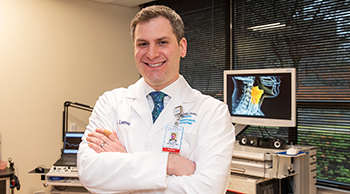The (burp) doctor is in
Retrograde cricopharyngeus dysfunction (R-CPD), also known as “no burp syndrome,” is a rare condition in which people are unable to burp or belch. It occurs when the cricopharyngeus muscle, a sphincter muscle that sits at the top of the esophagus, is unable to relax and, as a result, does not open to allow air to exit the esophagus.
Along with the lifelong inability to burp or belch, symptoms can include abdominal and/or chest bloating and pain, excessive flatulence, nausea, gurgling noises from the neck or chest, and difficulty vomiting or fear of vomiting (emetophobia).
“The reason a lot of people may not have heard about it is because it is a newly described condition,” explained Greenwich Hospital laryngologist (specialized ear, nose and throat doctor) Michael Lerner, MD. Dr. Lerner began treating this under-recognized disorder about four years ago and now, it is one of the most common conditions he treats.
The main treatment for R-CPD is a Botox injection into the cricopharyngeus muscle. Botox can be injected either endoscopically under general anesthesia or electromyography (EMG)-guidance.
For the endoscopic treatment, patients are given general anesthesia. The doctor inserts a rigid scope into the upper esophagus, visually locates the cricopharyngeus muscle, then injects it with Botox.
In an EMG-guided Botox injection, a doctor uses an EMG device to locate the cricopharyngeus muscle before injecting Botox into it through the skin. In this procedure, two adhesive leads are placed on the skin of the neck and a special electrode needle is placed in a syringe containing Botox. The doctor will then insert the needle into the neck, directing it toward the cricopharyngeus muscle. When the electrode needle reaches the muscle, it records its electrical activity. Next, the doctor injects the muscle with Botox. Often, the doctor will make multiple injections in different areas of the muscle.
Dr. Lerner’s reputation for treating R-CPD has attracted patients from across the country, and his passion for researching the condition has led to the early stages of the first genetics research study centered around the disorder. Dr. Lerner is teaming up with his brother, Bridgeport Hospital gastroenterologist Benjamin Lerner, MD, as well as Yale School of Medicine geneticists and speech-language pathologists.
In addition to genetics research, the team is conducting health-related quality of life research to measure the functional impact of treatment on patients who are often dismissed by healthcare providers unfamiliar with the symptoms of R-CPD. Dr. Lerner noted that many patients he has seen have been previously misdiagnosed because of the lack of knowledge surrounding R-CPD.
Samantha Miller, a patient of Dr. Lerner from New York City, recalls experiencing numerous gastrointestinal issues as a child. “I saw so many gastroenterologists, and none of them could figure out what was causing my stomach pain.” In 2019, she found an online community of people suffering from the same symptoms, allowing her to learn more about R-CPD. She then spent five years searching for doctors who treated the disorder (with little luck) before being referred to Dr. Lerner by her primary care physician.
“He [Dr. Lerner] immediately recognized what it was,” said Miller. “I spent every day of my life thinking about how much carbonation I was ingesting and about not being able to eat certain foods or drink certain drinks because they gave me such terrible bloating. Ever since this procedure, I have not thought about any of that. I have entered a reality where burping is now second nature.”
There is still much to be learned about no burp syndrome, but Dr. Lerner is optimistic about the future of treatment, especially at Greenwich Hospital. “I am proud to say that the Yale Medicine Voice Center here in Greenwich has become a national hub for R-CPD treatment and research.”

